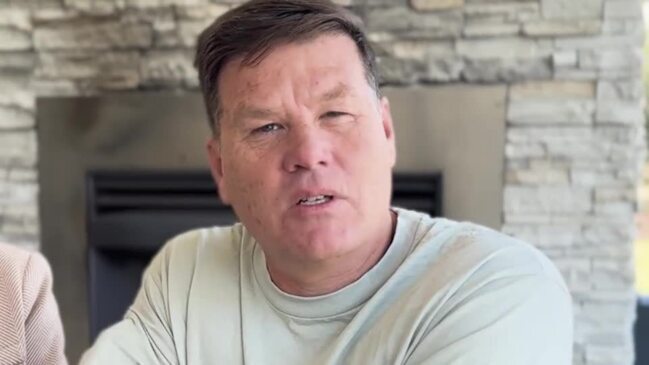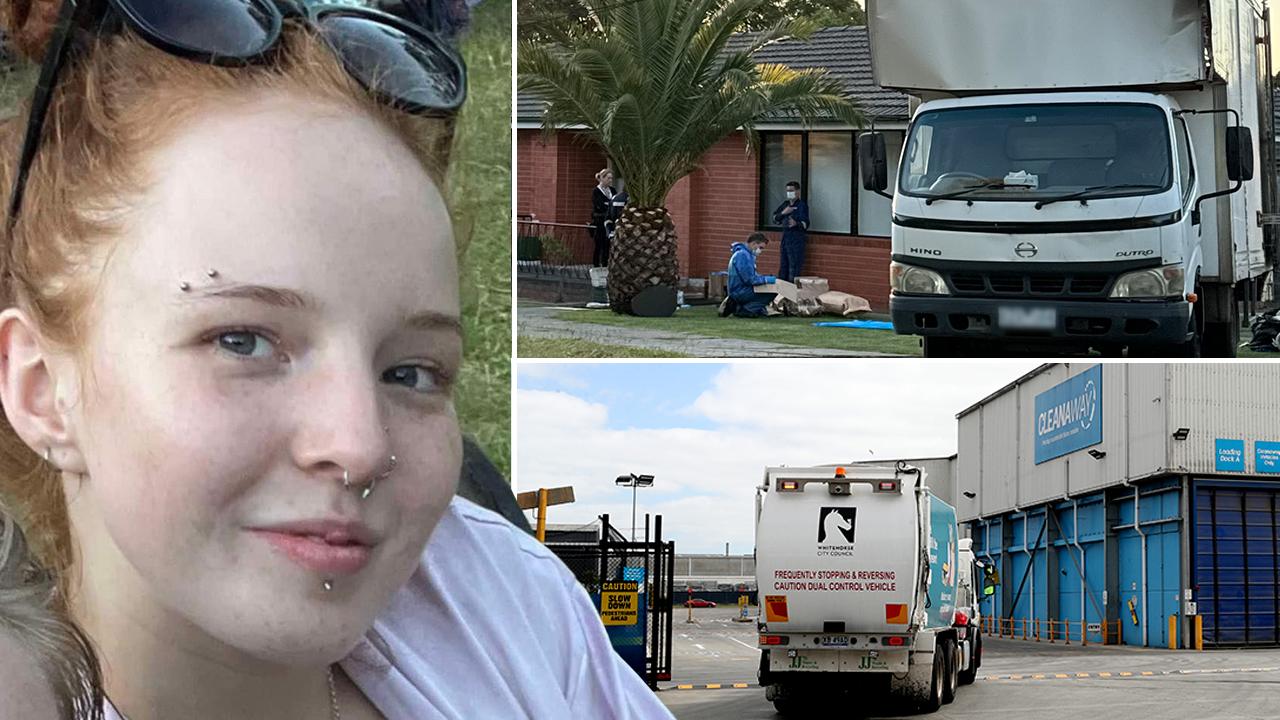Aftermath of concussions, CTE a daily struggle for former local footy star Troy Courts
Troy Courts, 48, can’t remember his wedding day, the first time he held his children or kicking a footy. He suffers debilitating headaches, dizziness and fatigue. This is his devastating story.

Victoria
Don't miss out on the headlines from Victoria. Followed categories will be added to My News.
Photos are all Troy Courts has to unlock memories – literally.
He does not remember the day he married his wife, Mel.
Nor can he recall the moment he first held his son Charlie, and daughter Lila.
These special moments are among the large chunks of his life that have vanished from his brain.
The Moama father-of-two is only 48 years old and has chronic traumatic encephalopathy (CTE) dementia.

The debilitating illness – caused by repeated head injuries during his illustrious community football career – is slowly taking over his body.
“I do not even remember playing football – I couldn’t even tell you a single kick that I had,” the avid footballer told the Sunday Herald Sun.
“The memory stuff is probably where I struggle the most.
“I can have the same conversation with the kids three times in a day and ask them the same question the fourth time, and I just see them shake their heads.”

He played for Glenroy Football Club for 11 years, including the 1997 premiership win.
But it was during these glory days he suffered at least five serious concussions that saw him taken off the field – three of which he returned to the game soon after.
Being a nurse, Mel knew something was wrong with her husband about four years ago when he started having constant, debilitating headaches.
“I then noticed changes in his cognition and his memory,” Mel recalled.
“He was also having falls at home, and changes to his personality.”
Headaches, dizziness and fatigue are now a daily occurrence.
“It is torture for Troy,” Mel explains. “When his headaches get so bad, he wants to smash his head against the wall to get rid of them.”
“If I didn’t have Mel and the kids, I honestly do not think that I’d be here,” Troy said. “That’s my fight now.”
Suicidal ideation is another common symptom of CTE, with former AFL players Danny Frawley and Shane Tuck both having CTE when they took their lives.
Life for the Courts family is now very different.
Overseas family holidays, water skiing, triathlons, camping and motorbike riding are no more.
They have become isolated from friends as Troy struggles in social, noisy settings.
By 4pm, he is often so fatigued he can’t hold a conversation. He is in bed most nights by 7pm.
“This has changed our whole life,” Mel said. “It’s pretty bloody horrific.”
Troy adds: “It’s not fair on the kids.”
The doting dad has had to give up his work as an arborist, as well as being a CrossFit coach, competing in triathlons, and coaching his son’s local football team.
Looking through photos, Mel stops to point out one where Troy is deadlifting in a CrossFit championship.
“You can see he was a real athlete, a fitness fanatic,” Mel said.

“Now, he can’t even bend down without getting dizzy.”
He has to wear a fall monitoring alarm, and requires a carer, with his days based around medical appointments for occupational therapy, speech therapy and psychology.
Reminder notes, written by Mel, are littered around the family home, telling him to do simple things like eat lunch or he would forget.
Another thing that comes with CTE, Mel says, is anger, irritability and mood swings.
“Troy was never an angry or aggressive person,” Mel said. “Now he has to daily try and manage his moods. He can go from zero to one hundred in a minute and can be so angry. You walk on eggshells as a carer for someone with CTE. Wondering what will happen next.
“It’s quite scary and Troy also isolates himself as he worries about the fact he might lose control.”
A life saver for Troy are his noise cancelling headphones. He takes them everywhere with him, including to watch his son play football, and his daughter take to the netball court.
“A question I get asked a lot is, ‘Why do you let your son play football?’” he said. “And always my response is, ‘Well why do you let your son play football? It’s the same.’.”
They have spoken to Charlie about the dangers and know the protocols are different now, with, with 21-day mandatory breaks introduced by the AFL earlier this year for country footballers involved in concussion incidents.
But Mel said, if Charlie is to suffer a concussion, she would not allow him to play for four weeks as that is the recommendation from last year’s senate inquiry into concussions and repeated head trauma in contact sports, and latest CTE research.
The father and son used to go and watch their beloved Carlton play weekly.
This season they have been once, and it left Troy in bed recovering for the two days after.
While they can’t change their situation, the family wants to advocate for change in the game.

“CTE is the only form of dementia in the world that is entirely preventable,” Mel said.
She urged local clubs and the AFL to follow the guidelines recommended from the senate inquiry, especially the return to play protocols.
“Let’s protect the next generation of footballers like my 15-year-old son from this devastating and insidious disease that destroys people’s lives and tears apart families,” she said.
Troy said the playing guidelines around concussion had improved immensely from his time on the field.
But more could be done.
He said it made no sense that AFL players are required to only have a 13-day break after a concussion, whereas a local footballer has to have 21.
But he said the repeated public pushes for helmets would not prevent concussions.
“Troy wore a helmet every game,” Mel said.
“It’s very well documented now that helmets won’t save you from getting CTE.”
Troy and Mel don’t like to think too much about the future as they know there is no cure.
It’s only going to get worse.
“I’m a day to day person now,” Troy said.
With Troy unable to work, the rising costs of living and medical bills piling up, the family said they had no option but to pursue compensation from the Glenroy Football Club.
It was not an easy decision, as they see the club and many of its members as family.
“Troy’s injuries were sustained playing football,” Mel said.
“That’s the only reason that he has degenerative brain disease.
“It’s robbed Troy of his life. It’s robbed me of my husband, and it’s robbed the kids of their dad.”
When contacted by the Sunday Herald Sun the club said it was aware of the claim made by Mr Courts.
“We acknowledge a claim has been made by a former player and this has been referred by the club to the relevant AFL insurer and as it is subject to legal proceedings, no further comment will be made,” a club spokesperson said.
Originally published as Aftermath of concussions, CTE a daily struggle for former local footy star Troy Courts



